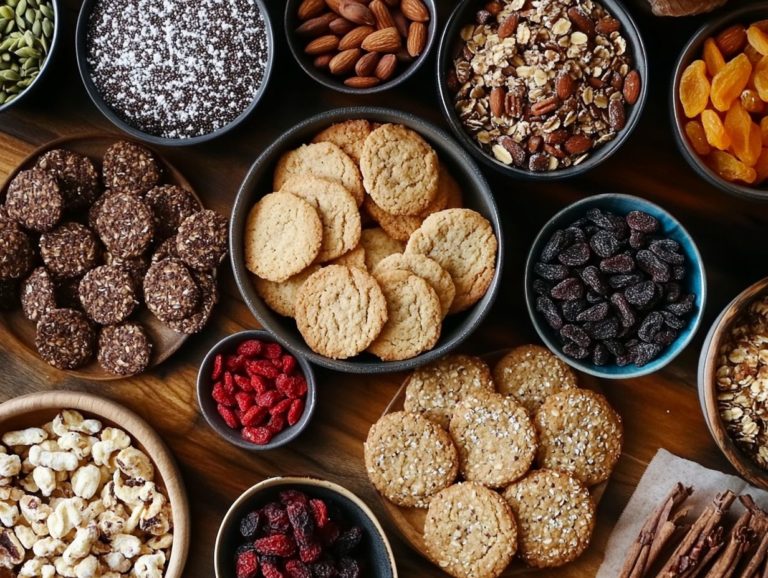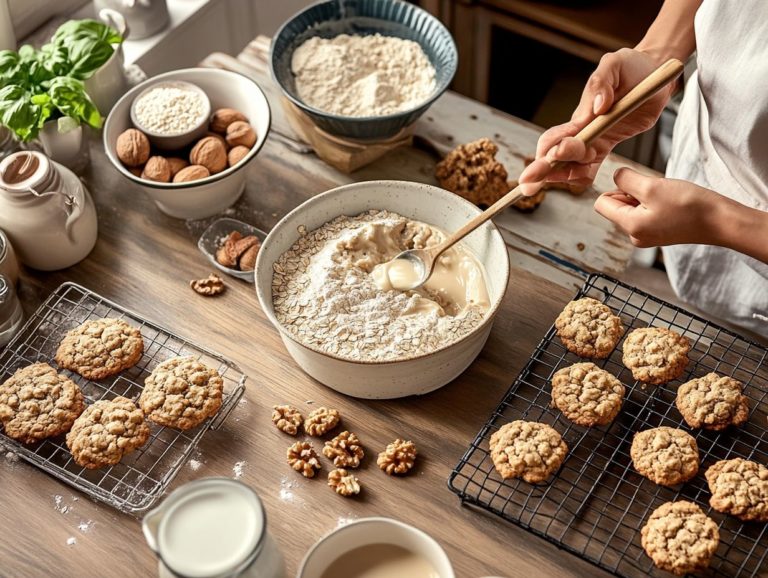Plant-Based Cookies: Perfect for Every Occasion
In a world that increasingly prioritizes health and sustainability, plant-based cookies, also known as vegan pantry cookies, present a delightful solution for dessert enthusiasts like you. These treats not only offer a multitude of health benefits but also cater to diverse dietary needs, such as those following a vegan diet, while being gentler on the planet.
This guide will walk you through essential ingredients, popular flavors, and invaluable home-baking tips, including baking techniques and recipe notes. You ll be equipped with everything you need to know about plant-based cookies.
Whether you re a seasoned vegan or simply exploring new culinary horizons, there s plenty here for you to savor and enjoy, including scrumptious desserts and soft chewy cookies!
Contents
- Key Takeaways:
- Why Choose Plant-Based Cookies?
- What Ingredients Are Used in Plant-Based Cookies?
- What Are Some Popular Plant-Based Cookie Flavors?
- How to Make Plant-Based Cookies at Home?
- Where Can You Buy Plant-Based Cookies?
- How to Store Plant-Based Cookies?
- What Are Some Ideas for Serving Plant-Based Cookies?
- Frequently Asked Questions
- What are plant-based cookies and why are they perfect for every occasion?
- What ingredients are typically used in plant-based cookies?
- Are plant-based cookies healthier than traditional cookies?
- Can plant-based cookies be just as tasty as traditional cookies?
- Are plant-based cookies suitable for those with dietary restrictions or preferences?
- What occasions are plant-based cookies perfect for?
Key Takeaways:

- Plant-based cookies offer numerous health benefits, making them a guilt-free treat for any occasion.
- Using plant-based ingredients in cookies is not only good for your health but also for the environment, reducing the need for high-impact dairy farming.
- With their allergy-friendly ingredients, including gluten-free flour and non-dairy milk, plant-based cookies can be enjoyed by everyone, regardless of dietary restrictions.
Why Choose Plant-Based Cookies?
Plant-based cookies are on the rise, and it s not just because they taste amazing. These delightful treats come packed with a host of health benefits that you ll appreciate.
By using ingredients such as vegan butter, almond butter, coconut sugar, and flax eggs (a mixture of ground flaxseed and water used as an egg substitute), you can indulge in a dessert that aligns with your vegan lifestyle without sacrificing flavor. They re not only kind to the planet but also offer allergy-friendly options for those with sensitivities to conventional baking ingredients.
With their focus on health and sustainability, plant-based cookies truly represent a feel-good choice for everyone.
1. Health Benefits
Consuming plant-based cookies can unlock a multitude of health benefits, thanks to their use of wholesome, vegan ingredients like all-purpose flour, ground cinnamon, ground flaxseed, and nuts such as walnuts that are full of nutrients.
By incorporating alternatives like coconut sugar, you not only infuse your cookies with a delightful caramel-like sweetness but also benefit from a lower glycemic index compared to traditional sugars. This means that these cookies can assist you in better managing your blood sugar levels.
The addition of vegan chocolate, brimming with antioxidants and essential minerals like magnesium, significantly enhances the nutritional profile of these treats. In fact, a typical serving can provide around 25% of your daily recommended intake of magnesium, promoting improved muscle and nerve function.
When enjoyed as an occasional treat, these healthier cookie options can effortlessly integrate into your balanced diet, allowing you to indulge without compromising on health or flavor. They are a perfect example of healthy ingredients forming healthy cookies.
2. Environmentally Friendly
Plant-based cookies are a tasty way to help the planet! They utilize ingredients that have a lower environmental impact compared to traditional cookie recipes, thus presenting an eco-friendly alternative.
These innovative delights also use vegan butter, which not only lessens reliance on dairy farming a notable contributor to greenhouse gas emissions but also embraces a more ethical approach to food production. By opting for organic sugars sourced from sustainable agriculture, you help reduce chemical runoff, which can be detrimental to ecosystems.
When you juxtapose these ingredients with their conventional counterparts, it becomes evident that plant-based options play a significant role in waste reduction and resource conservation. This shift toward more sustainable baking resonates with the increasing consumer awareness and demand for environmentally conscious choices, ultimately nurturing a healthier planet.
Allergy-Friendly
One significant advantage of plant-based cookies is their remarkable ability to be customized for allergy-friendly enjoyment, accommodating a variety of dietary restrictions, including gluten intolerance and nut allergies. This flexibility makes them the ultimate treat for everyone!
Imagine substituting all-purpose flour with gluten-free alternatives like almond or oat flour. This allows you to create delectable cookies that everyone can savor. By replacing eggs with flaxseed meal or applesauce, you’re not only catering to those with egg allergies but also enhancing the texture of your cookies.
Common allergens like dairy can be seamlessly eliminated by incorporating plant-based milks or coconut oil. This approach invites a wider audience to relish the sweet delight of cookies and inspires creativity in your kitchen, leading to treats that are both delicious and inclusive.
What Ingredients Are Used in Plant-Based Cookies?
Plant-based cookies are expertly crafted with a selection of ingredients that elevate their flavor while perfectly aligning with vegan dietary standards. You’ll find key components such as flour alternatives like gluten-free flour, sweeteners like coconut sugar and brown sugar, and binders like flax eggs.
These ingredients contribute to a delightful texture and ensure that your cookies are both delicious and nutritious.
Flour Alternatives
When you’re crafting plant-based cookies, selecting the right flour alternative be it gluten-free flour or traditional all-purpose flour is crucial for achieving that perfect texture and flavor.
The choice of flour can dramatically affect the outcome of your baked treats. For example, almond flour brings a rich, nutty flavor and a moist texture. This creates a delightful contrast in chocolate chip cookies. Oat flour, made from finely ground oats, lends a chewy consistency and a gentle sweetness, making it an excellent choice for oatmeal cookies.
If you’re navigating celiac disease or gluten sensitivities, consider using gluten-free blends specifically designed for baking. It’s also essential to consider how they help hold the cookies together and how they interact with plant-based ingredients like flaxseed or applesauce, which can enhance your cookie’s structure and moisture content beautifully.
Sweeteners

Sweeteners are essential in crafting the flavor profile of plant-based cookies. Options like coconut sugar and brown sugar offer natural sweetness without sacrificing your health.
These alternatives elevate the taste and bring unique nutritional benefits to the table. For example, coconut sugar boasts a lower glycemic index compared to white refined sugar, making it a smarter choice for anyone keeping an eye on their blood sugar levels. Agave nectar is another fantastic substitute, providing a mild sweetness that integrates seamlessly into recipes requiring a liquid sweetener.
Maple syrup, rich in antioxidants, infuses a delightful, earthy flavor, while date syrup comes loaded with essential nutrients and fiber, ensuring a wholesome treat.
When incorporating these sweeteners into your plant-based cookie recipes, remember to adjust the other liquid ingredients accordingly. This will help you achieve the perfect texture and moisture that makes for a truly irresistible cookie.
3. Binders
Binders like flax eggs are essential in your plant-based cookie recipes, providing the necessary structure and moisture to ensure your cookies maintain their shape. Flax eggs, made from ground flaxseed mixed with water, are perfect for achieving that desired consistency.
Plus flax eggs, you ll find several other effective binders that can help you achieve the perfect texture in vegan baking. For instance, consider using chia seeds; when combined with water, ground chia seeds form a gel-like consistency that serves as an excellent binding agent. Applesauce is another popular alternative, offering natural sweetness while keeping your dough moist.
Other options at your disposal include silken tofu or mashed bananas, both of which add a creamy texture that enhances the overall mouthfeel of your treats.
By understanding how these binders work together, you can improve the structure of your cookie dough while enriching the overall flavor profile, making your vegan creations just as delightful as their traditional counterparts. This knowledge ensures cookie dough perfection.
4. Flavorings
Adding flavorings like ground cinnamon and vanilla extract can truly elevate the taste of your plant-based cookies, transforming them into a delightful sensory experience. These ingredients don t just enhance sweetness; they also infuse warm, aromatic notes that make your baked treats utterly irresistible.
To further enrich the flavor profile, consider incorporating other spices such as nutmeg or ginger, each offering its own unique qualities that can set your cookies apart. A hint of flaky sea salt can also add a delightful contrast.
A touch of citrus zest can provide a bright contrast, while ingredients like almond extract or cocoa powder introduce depth and richness. Achieving the perfect balance is essential carefully playing with the intensity of flavors ensures that none overpower the others.
Don t hesitate to experiment with various nuts, dried fruits, or even a pinch of sea salt; these additions can yield scrumptious variations, allowing for a delightful mix of textures and tastes in every bite.
What Are Some Popular Plant-Based Cookie Flavors?
In the realm of plant-based cookies, a selection of beloved flavors truly shines. You ll find that the classic chocolate chip remains a timeless favorite, while the hearty oatmeal raisin offers a comforting chew. If you’re a fan of chocolate chunk, you’ll be delighted by the rich, indulgent bites they provide.
The creamy peanut butter adds a rich, indulgent touch, and the delightful snickerdoodle brings a whimsical sweetness that never fails to impress. Each of these flavors has captured the hearts of many, making them essential choices for cookie enthusiasts. For those on a vegan diet, these cookies are the perfect scrumptious desserts to enjoy.
1. Chocolate Chip
Chocolate chip cookies have always held a special place in the hearts of dessert lovers, and when you swap in vegan chocolate chips, they transform into a decadent yet entirely plant-based delight.
To craft your own vegan version of this beloved classic, you ll want to replace traditional ingredients like butter and eggs with their plant-based counterparts, such as vegan butter and flax eggs.
For example, using coconut oil or vegan butter in place of dairy butter brings a similar richness while ensuring your cookies remain irresistibly soft and chewy.
A clever mix of ground flaxseed meal and water serves as an excellent egg substitute, providing the necessary binding and moisture without sacrificing flavor.
Choosing brown sugar over granulated sugar not only deepens the flavor but also enhances that coveted chewy texture. With these thoughtful substitutions, your cookies will not only remain utterly delicious but will also be perfectly suited for anyone seeking plant-based options.
2. Oatmeal Raisin
Oatmeal raisin cookies offer a delightful blend of hearty rolled oats and the natural sweetness of dried fruits, positioning them as a wholesome and satisfying treat. Baking these delightful cookies is an enjoyable experience that you ll love to share!
Choosing high-quality rolled oats is essential for achieving that perfect chewy consistency. These oats not only pack in essential nutrients but also elevate the cookies’ overall flavor profile. When selecting dried fruits, opt for fresh, plump raisins or currants, as they significantly enhance the taste, providing a delightful contrast to the robust oats.
As a baker, you may find joy in experimenting with this classic recipe by incorporating mix-ins like crunchy nuts, rich chocolate chips, chopped walnuts, or even luscious coconut flakes. Each addition introduces new textures and flavors while maintaining the timeless essence of the beloved oatmeal raisin cookie.
3. Peanut Butter
Peanut butter cookies present a rich, creamy flavor and are often your go-to choice for a healthier cookie alternative.
You can elevate this classic treat by swapping traditional ingredients for plant-based options that retain the delightful taste and texture, such as almond butter or coconut sugar. Rather than using regular butter, consider coconut oil or a vegan butter alternative to achieve that desired creaminess.
For binding the ingredients, flaxseed meal or chia seeds mixed with water work wonders as effective egg replacements, helping you achieve the perfect consistency.
Opting for natural peanut butter free of additives will enhance the cookie’s flavor while keeping it wholesome. For sweetness, you might choose maple syrup or coconut sugar, which beautifully complements the nutty essence.
By thoughtfully selecting each component, you can indulge in delicious vegan peanut butter cookies without sacrificing an ounce of taste.
4. Snickerdoodle

Snickerdoodle cookies truly shine with their enchanting cinnamon-sugar coating, making them a cherished choice for cookie lovers everywhere. These delightful treats do more than just satisfy a sweet tooth; they evoke a sense of nostalgia for many who appreciate their tender, chewy texture.
What really sets them apart is their distinctive preparation method, featuring cream of tartar that imparts that signature tangy flavor. To achieve that ideal softness, it s crucial to mix softened butter with sugar until the mixture is light and fluffy, then gently fold in the eggs.
The addition of cinnamon in the dough, combined with the blissful rolling in cinnamon-sugar before baking, elevates their inviting aroma, ensuring they remain a comforting favorite for all ages.
How to Make Plant-Based Cookies at Home?
Creating plant-based cookies in the comfort of your kitchen is a truly gratifying endeavor! It enables you to tailor your treats with wholesome ingredients. From the vegan pantry to the cookie recipes you choose, each element matters.
From selecting premium components such as vegan butter and rolled oats to honing your baking techniques that ensure cookie dough perfection, every step of the process is enjoyable and immensely satisfying.
1. Gather Ingredients
To embark on your journey of crafting plant-based cookies, your first step is to gather all the essential ingredients:
- Vegan butter
- Coconut sugar
- Ground flaxseed
Each of these components plays a vital role in achieving a delightful texture and flavor. Vegan butter serves as the rich foundation, providing the necessary fat content while keeping your recipe entirely dairy-free. Don’t forget to add a pinch of ground cinnamon for an extra layer of warmth and flavor.
Coconut sugar does more than just sweeten; it imparts a lovely hint of caramel flavor, making it an outstanding alternative to conventional sugars. Ground flaxseed steps in as an egg substitute, expertly binding the mixture while lending a subtle nuttiness.
If you’re considering alternatives, apple sauce can gracefully replace vegan butter for a lower-fat option, and chia seeds can be an effective stand-in for flaxseed. It’s essential to prioritize high-quality, fresh ingredients, as they will dramatically elevate the taste and texture of your cookies.
This attention to detail ensures that your treats are not only scrumptious but also nourishing and satisfying.
Get started on baking your own plant-based cookies today!
2. Mix Ingredients
After you ve gathered your ingredients, the next step is to mix them expertly to create a cohesive cookie dough that promises soft, chewy cookies.
To achieve this, start by creaming together the butter and sugars until the mixture is light and fluffy. This process creates air pockets that will help your cookies rise beautifully during baking. It s a crucial step, as it allows the granulated and brown sugars to dissolve, enhancing both the flavor and texture of your dough.
Next, gradually incorporate the eggs, which will serve as binding agents, helping to meld the dry ingredients and resulting in a rich, moist consistency. When it s time to add the flour, baking soda, and salt, be careful to mix just until everything is combined. Overworking the dough at this stage could lead to tough cookies, and we certainly don t want that. For a gluten-free option, consider using gluten-free flour in place of traditional flour.
Finally, when you fold in the chocolate chips, ensure they are evenly distributed throughout the dough. This will guarantee that each delightful bite offers the perfect balance of sweeter and richness.
3. Form Cookies
Once your cookie dough is perfectly prepared, it s time to transform it into cookies by portioning the dough onto a prepared cookie sheet. For the best results, reach for a cookie scoop or a tablespoon to ensure each cookie is a uniform size, which will help them bake evenly.
Consider varying the size of your cookies to achieve different textures; smaller cookies tend to crisp up beautifully, while larger ones offer a delightful soft and chewy center.
As you place the cookie dough on the sheet, make sure to leave ample space about 2 inches between each ball of dough. This not only allows them to spread adequately without merging together but also promotes even cooking and enhances the overall presentation of your mouthwatering treats.
4. Bake and Enjoy!
It s time for you to bake those delightful plant-based cookies, adhering to specific baking instructions that ensure they emerge perfectly soft and chewy.
Begin by preheating your oven to 350 F (175 C) and lining a baking sheet with parchment paper to prevent any sticking mishaps. Next, scoop generous dollops of the dough onto the sheet, making sure to leave ample space for them to spread during baking.
Bake these delectable treats for about 10-12 minutes, keeping a vigilant eye on them in the final moments. The cookies should appear slightly underbaked in the center, as they will continue to firm up while cooling on the sheet.
After allowing them to cool for a few minutes, serve them warm alongside a glass of your favorite plant-based milk or a scoop of dairy-free ice cream. You ll savor how the rich flavors meld together, creating an indulgent treat that s bound to delight everyone. As a fun twist, sprinkle a touch of flaky sea salt on top for an extra layer of flavor.
Where Can You Buy Plant-Based Cookies?
If convenience is your priority, you ll find a wealth of options for purchasing plant-based cookies, from charming local bakeries to specialty stores and online retailers, making it easy to include them in your vegan pantry.
Many well-known brands have recognized the growing demand for vegan treats, allowing you to indulge your cravings without compromising your dietary choices. For example, popular names like Lenny & Larry’s and Enjoy Life present a delightful variety of cookies that cater to plant-based enthusiasts.
Grocery chains such as Whole Foods and Trader Joe’s feature dedicated sections for vegan products, showcasing an impressive selection of high-quality cookies that often include healthy ingredients. Online marketplaces like Amazon make it effortless to compare different brands, ensuring you find the best deals and read reviews from fellow cookie lovers. Whether you are on a vegan diet or just exploring plant-based recipes, the options are plentiful.
By exploring local vegan bakeries, you not only support small businesses but also enjoy the freshness and uniqueness of their cookie offerings, elevating your experience of savoring plant-based desserts like scrumptious desserts and soft chewy cookies.
How to Store Plant-Based Cookies?

Properly storing your plant-based cookies is essential for maintaining their freshness and that delightful chewy texture, ensuring you can savor them for days on end. Consider using vegan butter and coconut sugar for better texture preservation.
To achieve this, you should consider the type of cookie and how to best preserve its unique qualities. For example, cookies rich in nut butter or almond butter thrive in airtight containers that seal in moisture and keep them from going stale.
If you’re planning to store a larger batch, freezing cookie batches is a fantastic option. Simply place the cookies in a freezer-safe bag, making sure to remove all the air to prevent freezer burn, and they will stay fresh for up to three months.
When cravings hit, just thaw them at room temperature, and you ll enjoy a taste that feels just like they were fresh out of the oven. Use a cookie sheet to lay them out evenly while thawing.
What Are Some Ideas for Serving Plant-Based Cookies?
Serving plant-based cookies is not just a treat; it s an experience that opens the door to a world of creative presentation and delightful pairings, showcasing healthy ingredients that elevate your baking masterpieces.
Imagine presenting delightful cookie sandwiches, generously filled with creamy non-dairy frosting, or curating artful displays alongside a selection of non-dairy milks your options are truly limitless. Pair these delectable treats with a robust cup of coffee to achieve a harmonious balance, enhancing the flavors of both the beverage and the cookie in perfect unison. You could also offer vegan chocolate chip varieties or oatmeal cookies for added variety.
Let your creativity shine as you decorate each cookie; a drizzle of plant-based chocolate or a sprinkle of vibrant edible flowers can transform them into visual delights. Showcasing a variety of flavors, such as classic chocolate chip, chewy oatmeal raisin, sugar cookies, or refreshing matcha-infused cookies, will surely captivate your guests and invite them to indulge in the unique flavors you so thoughtfully present. For a healthier dessert option, consider trying plant-based cookies and don’t forget to add flaky sea salt for an extra touch of gourmet.
Frequently Asked Questions
Plant-based cookies are cookies that are made without any animal products, such as dairy or eggs. They are perfect for every occasion because they are delicious, healthier, and suitable for those with dietary restrictions or preferences. Using flax eggs and vegan butter can achieve amazing results without compromising on taste.
Common ingredients used in plant-based cookies include plant-based milk, such as almond or oat milk, coconut oil, and flax or chia seeds as an egg replacement. Other ingredients such as nuts, seeds, and fruits can also be used for added flavor and texture. Consider using all-purpose flour, baking powder, baking soda, and ground cinnamon as essentials in your vegan pantry.
Plant-based cookies can be a healthier option because they often have less saturated fat and cholesterol compared to traditional cookies. Additionally, they may contain more nutrients and fiber from the use of whole plant-based ingredients like rolled oats, ground flaxseed, and non-dairy milk.
Yes, plant-based cookies can be just as tasty as traditional cookies! With the right combination of ingredients and baking techniques, they can be just as indulgent and satisfying as traditional cookies. Try chocolate chunk or currants for interesting flavor twists.
Yes, plant-based cookies are suitable for those with dietary restrictions or preferences, such as those who follow a vegan or vegetarian diet. They are also suitable for those with allergies or intolerances to dairy or eggs. Additionally, using gluten-free flour can make them accessible to those with gluten sensitivities.
Looking for the perfect sweet treat? Plant-based cookies fit any occasion! They are great for parties, school snacks, or as a healthier dessert for special events.
Try different cookie recipes and types to keep things interesting.






